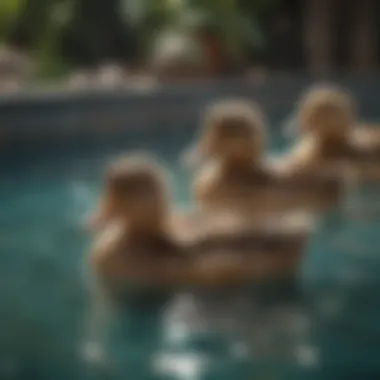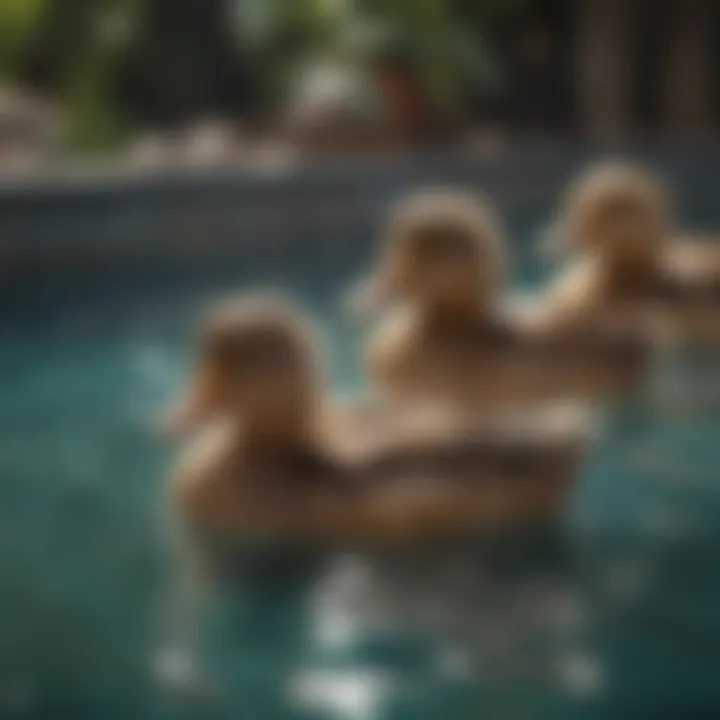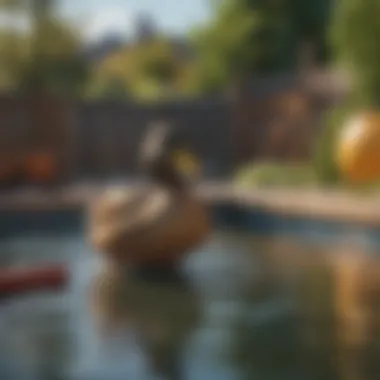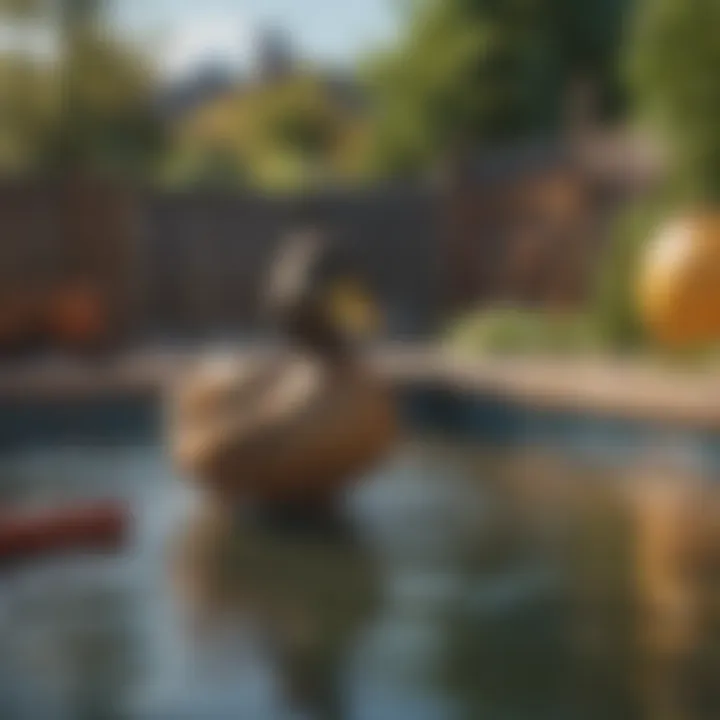Small Pool for Ducks: A Comprehensive Guide


Intro
Creating a small pool for ducks can enhance their living environment significantly. Ducks need access to water for various reasons, including cleaning, mating, and cooling off. This guide will address the practical considerations necessary for setting up a small pool, maintaining it effectively, and understanding the health benefits for ducks in both domestic and community settings. Establishing aquatic environments not only improves the well-being of the ducks but also ensures their ecological needs are met. This article will unpack the design aspects, maintenance tips, health factors, and community insights relevant to maintaining a small pool for ducks.
Design Considerations
When planning for a small pool, several aspects need attention. The size and depth of the pool should be appropriate for duck sizes. Generally, a pool depth of around 12 to 18 inches is suitable. Furthermore, the pool should offer gradual slopes to make it easy for ducks to enter and exit.
Location
Selecting a proper location is vital. Choose a spot that receives sunlight for a portion of the day but also provides shaded areas to protect ducks from overheating. It is preferable to have the pool near grassy areas for foraging.
Materials
The material used to construct the pool should be durable and non-toxic. Options include plastic, rubber, or concrete. Consider a liner if using a traditional pond setup to retain water better and facilitate cleaning.
Maintenance Tips
Maintenance is crucial for the longevity of the small duck pool. Here are some simple tips:
- Regular Cleaning: Clean the pool at least once a week. Remove debris and algae that may build up over time.
- Water Quality: Change the water regularly, ideally every few days, to maintain a healthy environment.
- Safety Measures: Ensure there are no sharp edges or harmful materials around the pool perimeter.
Health Benefits
A small pool provides various health benefits for ducks. Access to clean water helps in:
- Feather Maintenance: Ducks need to maintain their plumage by practicing preening in the water.
- Hydration: Drinking clean water helps in digestive processes and overall health.
"Ensuring ducks have access to clean water is as crucial as providing them with quality food. It significantly contributes to their health."
Being attentive to water hygiene will prevent the spread of illnesses, ensuring your ducks thrive in their environment.
Regulations and Legal Considerations
Before installing a small pool, familiarize yourself with local regulations. Many areas may have specific rules regarding water bodies in residential areas or community setups. Check with local authorities to avoid any potential legal issues. Sometimes permits are needed, especially if the setup is more extensive or involves larger water bodies.
Closure
Establishing a small pool for ducks requires careful thought and dedication to maintaining the environment. Through proper water management and attention to safety regulations, you can create a beneficial space for ducks that supports their health and overall behavior. In the sections that follow, we will delve into additional aspects, including product reviews specific to duck care, community tips for managing aquatic spaces, and wellness insights that ensure ducks lead enriching lives.
Intro to Duck Pools
Creating a small pool for ducks is a vital consideration for anyone interested in the proper care and welfare of these birds. Ducks are social, active animals that thrive in environments where they can engage with water. A well-designed pool not only enhances their living conditions but also fosters their natural behaviors.
Understanding Duck Behavior
To appreciate the significance of a duck pool, one must first understand duck behavior. Ducks are instinctively drawn to water. They use it for various essential activities like swimming, foraging, and socializing. When ducks swim, they display natural behaviors that are vital for their physical and mental health. Such activities reduce stress and promote social hierarchy among them. Observing ducks in a proper habitat can reveal their playful and curious nature, as they engage in splashing and diving. Furthermore, the presence of water helps in keeping their feathers waterproof through preening, which is a crucial aspect of their grooming routine. The design of a duck pool should therefore consider these behavioral aspects to ensure a fulfilling environment for the birds.
The Importance of Water for Ducks
Water serves multiple roles in the life of a duck. It is not just a recreational space; it is a fundamental requirement for their survival. Access to clean water allows ducks to forage naturally. They dabble and dive for food, finding insects, aquatic plants, and small fish. This natural foraging behavior contributes greatly to their diet and overall health.
Important health benefits derive from having a water source available. Ducks use water for thermoregulation. A cool dip on a hot day helps them maintain their body temperature. Additionally, water exposure minimizes health risks linked to dryness, such as feather damage and skin irritations. A small pool can drastically improve their living environment by replicating natural conditions.
In your efforts to provide a small pool for ducks, consider these benefits. The pooling of ducks, their behaviors, and the necessity for water indicate that you are investing in a happier, healthier flock. Effective duck care begins with understanding these fundamental needs.


Designing a Small Pool for Ducks
Designing a small pool for ducks is a crucial aspect of ensuring their well-being in a domestic or community setting. A well-thought-out design not only provides ducks with an essential habitat but also enhances their overall health and behavior. Ducks are aquatic animals that thrive in water, and their environments need to mimic natural conditions as closely as possible.
Factors to consider when designing such a pool include location, size, depth, and required materials. Each of these elements plays a significant role in both the functionality and durability of the pool. Doing it right promotes a healthy duck population.
Choosing the Right Location
When selecting a location for a small duck pool, various aspects must be in mind. Ducks prefer areas with some shade, as constant sunlight can lead to overheating. Ideally, choose a spot that has natural vegetation nearby. This not only provides shade, but also helps maintain water quality by filtering contaminants.
Accessibility is also important. Ducks need to enter and exit the pool easily. A gradual slope or a ramp can serve this purpose well. Consider the local climate too. In hotter regions, ensuring cool water is key. In contrast, in colder climates, the pool may need insulation to prevent freezing. Additionally, the location should allow for proper drainage to avoid stagnation, which can create unwanted odors or attract pests.
Optimal Pool Size and Depth
The size and depth of the pool greatly influence its usability for ducks. Generally, a small pool should be at least several feet in length and width. A dimension of 6 feet by 4 feet could be a good starting point. Depth is equally crucial. Ducks need enough water to submerge their heads for grooming and feeding. A minimum depth of one foot is recommended but having deeper areas is beneficial. Having varying depths can encourage ducks to engage in natural swimming behaviors.
Overcrowding must also be considered. Too many ducks in a small space can lead to quick degradation of water quality. Ensuring sufficient size relative to the number of ducks will promote a healthier environment.
Materials Required for Construction
The construction of a duck pool requires specific materials to ensure longevity and hygiene. The most common materials are waterproof liners, concrete, or natural ponds lined with clay. Each of these options has distinct advantages. A waterproof liner is inexpensive and relatively easy to install. Concrete provides durability and low maintenance, while clay offers a more natural look but can be tricky to maintain.
Some necessary tools for construction may include:
- Shovels for excavation
- A level to ensure even construction
- A pump for water circulation
Furthermore, consider using non-toxic sealants and natural stones to enhance aesthetic appeal while maintaining safety for local wildlife.
Important: Using improper materials can compromise the health of ducks and create hazards. Always conduct research on materials beforehand to ensure safety.
In summary, the design phase of a small pool for ducks is foundational to their health and behavior. Selecting the suitable location, determining appropriate pool size and depth, and choosing the right construction materials can create an optimal environment. These elements work together to provide a habitat where ducks can thrive, maintaining both their physical health and their overall happiness.
Construction Process
The construction process of a small pool for ducks is an essential component of establishing an optimal aquatic environment for these birds. A well-constructed pool can support duck health, promote natural behaviors, and enhance the overall ecosystem in which they live. Each phase of construction requires specific attention to detail, ensuring that the pool is both functional and safe for ducks while meeting the landscape's needs.
Excavation and Shaping
Excavation serves as the foundational step in building a small pool for ducks. This involves removing soil to create the desired shape and depth of the pool. Proper shaping is critical, as it influences both the aesthetics and functionality of the pool. Ideally, the bottom should slope gradually, which helps ducks access shallow areas for resting and deeper sections for swimming.
Considerations for excavation include:
- Location: Ensure that the site has good drainage to prevent water accumulation that may lead to unsanitary conditions.
- Size: The pool must be large enough to accommodate the number of ducks expected and allow them to swim freely.
- Safety: Avoid sharp edges or steep drop-offs that could pose a risk to the birds.
Taking these factors into account enhances the overall duck experience and promotes their safety in the water.
Waterproofing Techniques
Once the excavation is complete, the next step involves waterproofing the pool to prevent water loss. This is crucial for maintaining a consistent water level while ensuring the ducks have access to clean water at all times. There are several techniques available for waterproofing, including:
- Liner Installation: Using a durable vinyl or rubber liner can effectively hold water and is often an easy solution for small pools. Properly installed liners will conform to the pool’s shape and resist wear from mud and duck activity.
- Natural Clay: If available, clay can also be used as a waterproofing agent. When compacted, it creates an impermeable barrier, but this requires careful application and may need regular maintenance.
- Concrete Coatings: For a more permanent solution, consider applying a sealer to a concrete base. These coatings can protect against water and the elements while allowing for elaborate designs.
By implementing effective waterproofing techniques, the longevity of the pool increases, reducing the need for regular refilling and providing a stable habitat for ducks.
Setting Up Inlet and Outlet Systems
The establishment of inlet and outlet systems is a vital aspect of maintaining water quality within the duck pool. Proper circulation helps to prevent stagnation, ensuring a consistent flow of fresh water that ducks require to thrive.


For effective inlet and outlet systems, consider the following:
- Inlet Design: An inlet should be designed to deliver fresh water into the pool while minimizing the risk of contamination. This can involve directing water from a reliable source, such as a garden hose or rainwater collection system, directly into the pool.
- Outlet Placement: Outlets need to be positioned to allow for easy drainage and cleaning. A bottom drain can facilitate regular water changes, ensuring that debris and waste do not accumulate in the pool.
- Filtration: Including a filtration system in your design will further enhance water quality. This could include a simple mechanical filter that removes debris or a more advanced biological filter that promotes healthy ecosystems within the pool.
Overall, setting up these systems helps to maintain a healthy environment for ducks, reducing the potential for disease and fostering their well-being.
Maintenance and Care
Maintenance and care for small duck pools are crucial for ensuring the health and well-being of the ducks. A well-maintained pool not only contributes to the ducks' enjoyment but also affects their overall health. Continuous attention to this aspect can prevent many common ailments and ensure the aquatic environment remains safe and clean.
Water Quality Management
Water quality management is a fundamental element in maintaining a duck pool. Ducks are sensitive to changes in water conditions, which can lead to health problems if not addressed. Regular testing of water parameters such as pH, ammonia, and nitrite levels is necessary.
- pH Levels: Ducks thrive in water with a pH between 6.5 and 8.5. Check these levels frequently, adjusting as needed with safe chemicals.
- Ammonia and Nitrites: High levels of ammonia and nitrites can cause respiratory issues. Regular water changes can help keep these levels low.
Implementing a filtration system can significantly improve water quality. Systems like the Aquascape Waterfall Spillway or the OASE BioSmart can help keep the water clean longer.
Consider the introduction of plants that can act as natural filters, helping to break down waste products in the water.
Preventing Algae Growth
Algae growth is a common issue that affects many small duck pools. While some algae serve as food sources, excessive growth can alter water chemistry and harm your ducks. To prevent algae proliferation, consider these strategies:
- Lighting: Limit direct sunlight exposure to reduce the growth of algae. Shade provided by plants or umbrellas can help.
- Nutrient Control: Algae thrive on nutrients, particularly nitrogen and phosphorous. Avoid overfeeding ducks and remove uneaten food from the water.
- Water Movement: Maintaining some level of water movement can discourage excessive algae growth. Using fountain pumps or aerators will keep the water circulating.
Regularly removing algae manually or using safe treatments can keep the pool clean. Monitoring and upkeep are key to a balanced ecosystem in your duck pool.
Regular Cleaning Procedures
Establishing a routine cleaning schedule is vital for maintaining a small pool. Regular cleaning helps to remove organic debris and keeps the water fresh. Here are steps to follow:
- Weekly Cleaning: Remove visible debris like leaves and feathers. A skimmer net or similar tool can be very useful for this task.
- Monthly Draining: Completely drain and clean the pool at least once a month. Use this time to scrub the sides to remove any residual algae or dirt.
- Water Replacement: Refill the pool with fresh water after cleaning. This helps maintain optimal water quality for the ducks.
- Monitoring Equipment: Regularly check and clean filters or pumps. This prevents breakdowns and ensures effective filtration.
A clean pool encourages ducks to engage in their natural behaviors, leading to healthier and happier ducks.
Regular attention to maintenance not only contributes to the health of the ducks but also provides owners with peace of mind, knowing their pets have a safe environment.
Health Benefits for Ducks
Creating a small pool for ducks is not just a feature for aesthetic appeal; it offers numerous health benefits crucial for their overall well-being. Understanding these advantages provides compelling reasons for establishing such aquatic environments. Ducks require both physical and mental stimulation. A small pool serves as a source for exercise, hygiene, and social interaction. By ensuring clean water sources, we can promote healthy habits in ducks, leading to a longer life span and reduced medical issues.
Hygiene and Parasite Control
Maintaining proper hygiene is one of the most significant benefits a small pool can provide for ducks. Water allows ducks to engage in preening, which is essential for feather maintenance. During this behavior, ducks can effectively spread oils that keep their feathers waterproof. Furthermore, access to fresh water enables ducks to bathe frequently, removing dirt and debris from their feathers.
Clean water also plays an essential role in controlling parasites, such as mites and lice. By having a designated swimming area, ducks can decrease the likelihood of these pests infesting their bodies. Regular cleaning of the pool and ensuring that water is regularly changed will minimize the risk of disease and infections, thus ensuring a healthier duck population.
Regular inspections and checks should be conducted to eliminate any stagnant water, which is a breeding ground for mosquitoes and other pests. Making sure that the pool is well-maintained and kept freshwater is crucial for duck health.
Physical Activity and Exercises
Ducks are naturally active animals that thrive when given space to move and engage in physical activities. A small pool provides an ideal setting for this. Swimming strengthens their muscles and improves their cardiovascular health. Ducks can dive, splash, and paddle freely, allowing them to maintain desired fitness levels.
In addition to swimming, ducks participate in behaviors such as dabbling and foraging within the water. These activities simulate their natural habitat and promote cognitive engagement, which is vital for their mental health. By providing a pool, owners encourage ducks to maintain an active lifestyle, reducing issues related to obesity and sedentary behavior.
Engaging in physical activities not only helps ducks gain stamina but also enhances their overall mood and social interactions, contributing to a harmonious environment.
Encouraging natural behaviors through proper pool design and maintenance is essential. Offering floating objects or ramps can further enhance exercise opportunities, allowing ducks to explore their surroundings and stay physically fit.


Understanding Local Regulations
Understanding local regulations is a critical aspect of establishing a small pool for ducks. This consideration ensures compliance with community laws and promotes sustainable practices that protect both ducks and local ecosystems. Engaging with these regulatory frameworks can help prevent potential legal issues and promote better welfare for your ducks.
Permitting and Licensing Considerations
Before beginning the construction of a duck pool, it is essential to verify if there are any permits or licenses required by local authorities. Each region may have different rules governing water features or animal husbandry, which can impact how you design and manage your pool.
- Water Use Permits: Some areas require permits for the use of water from natural sources. This could include ponds or rivers.
- Zoning Regulations: Check your local zoning laws. They can dictate where you can place a pool and how large it can be.
- Animal Welfare Laws: Ensure that your plans align with local animal welfare legislation related to the care of domestic ducks.
Understanding and complying with local regulations protects your investment and ensures the well-being of your ducks.
Environmental Impact Assessments
Conducting an environmental impact assessment is vital when planning a small pool for ducks. This process evaluates the potential effects of the pool on the surrounding environment. Here are key points to consider:
- Local Wildlife: Assess whether the pool could disrupt local wildlife. The presence of ducks may attract or deter other species.
- Ecosystem Health: Investigate how your pool will interact with the local ecosystem. Will it affect drainage, flooding, or erosion?
- Pollution Risks: Consider how runoff or waste from the pool might contribute to water contamination.
- Community Engagement: Involving local residents and stakeholders during the assessment process can provide insights and build support for your project.
Properly assessing environmental impacts not only aligns with regulatory standards but also encourages responsible duck ownership that respects the surrounding habitats.
Community and Ecosystem Impact
Establishing a small pool for ducks carries various benefits that extend beyond the immediate needs of the birds themselves. This section will explore how integrating such pools into a community setting can enhance local ecosystems and cultivate educational opportunities.
Integration into Local Biodiversity
Ducks play a vital role in the overall health of local ecosystems. When a small pool is created for ducks, it does not just serve as a water source but also as a habitat that can attract other wildlife. The presence of a small body of water can support different species, including insects, amphibians, and plants. This, in turn, promotes biodiversity in a given area.
Here are some benefits of integrating duck pools into local biodiversity:
- Habitat Creation: Duck pools can provide an environment that supports various forms of life. This can lead to an increase in the number of species that can thrive in local areas.
- Nutrient Cycling: Duck activity in the water, such as foraging and excreting waste, can introduce nutrients into the surrounding soil. This enhances plant growth and contributes to a richer ecosystem.
- Natural Pest Control: Ducks eat harmful insects and pests, reducing their populations. This is beneficial for plants and crops in nearby gardens and fields.
As community members recognize these benefits, they may become more willing to engage in conservation efforts and create environments that support biodiversity.
Educational Opportunities in Local Communities
The establishment of small duck pools offers various educational opportunities for local communities. They can serve as a living classroom, where individuals of all ages can learn about animal behavior, ecosystem management, and environmental stewardship. Educational programs can use the pools to:
- Educate on Water Management: Understanding the importance of water quality and management is crucial for many ecological studies. Workshops centered around maintaining the pools can teach valuable lessons in water ecology.
- Promote Wildlife Observation: Observing ducks and their behavior can spark curiosity in individuals, encouraging them to learn more about wildlife conservation and biology.
- Cultivate Responsibility: Participating in the care of a small duck pool can instill a sense of responsibility among community members, especially children. This contributes to a generation that values animal welfare and environmental health.
"Educating communities about their local ecosystems can lead to more informed, environmentally-conscious citizens."
Incorporating small pools for ducks into neighborhoods provides a plethora of benefits to both the ecosystem and community members, offering valuable learning experiences and promoting wildlife conservation efforts.
The End
Establishing a small pool for ducks is an important endeavor that combines practicality with the welfare of the animals. This final section synthesizes the key points discussed throughout the article, emphasizing the multifaceted benefits of having a dedicated aquatic environment for ducks. Such pools not only enhance the quality of life for these birds but also contribute positively to local ecosystems.
Summarizing Key Points
- Understanding Duck Needs: Ducks thrive in environments that provide both physical space and access to water, which satisfies their natural instincts. Their behavioral patterns show they are social creatures, and providing a pool encourages natural interactions.
- Design and Maintenance: The design of a small pool must focus on the optimal size, depth, and materials. Regular maintenance is critical to keep the water clean and safe for the ducks.
- Health and Hygiene: Maintaining water quality reduces the risk of parasite infestations and promotes healthy duck populations. Clean water is essential for the physical and psychological well-being of ducks.
- Community and Ecosystem: Integrating a small duck pool into local spaces fosters biodiversity and supports environmental education for community members.
"A well-maintained pool not only benefits ducks but also serves as an educational tool for those interested in waterfowl care."
- Regulatory Awareness: Being aware of local regulations pertaining to waterfowl management is necessary to ensure responsible care practices.
Through these key points, the relevance of providing an aquatic environment for ducks becomes clear. It is a commitment that extends beyond simple pet ownership; it involves understanding the broader impact on ecology and community well-being.
Future Directions for Duck Care
Looking ahead, the future of duck care within small pools offers exciting opportunities for both enthusiasts and casual pet owners. Here are some potential directions to consider:
- Innovative Water Filtration Systems: Investing in advanced, eco-friendly filtration systems can reduce maintenance efforts and enhance water quality.
- Water Conservation Techniques: Exploring methods to recycle pool water or using rainwater can promote sustainability.
- Community Workshops: Hosting workshops that educate about the benefits of duck pools can inspire others to create their own aquatic spaces for ducks.
- Research and Innovation: Engaging in research about the latest findings in animal behavior can lead to improved designs and care methods.







